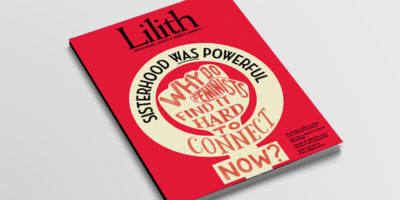Tellings and Retellings in Books for Young Readers
Two new picture books are geared toward the Fourth Generation, the generation of Holocaust survivors’ great-grandchildren.
The Amsterdam horse chestnut tree that grew in the courtyard of the “Secret Annex” is the narrator of Anne Frank and the Remembering Tree by Sandy Sasso, illustrated by Erika Steiskal (Skinner House Books, $16). The tree, a quiet witness to Anne’s life in the attic, lived to be 170 years old before it eventually broke in a storm. In a symbolic gesture of hope, saplings from the tree are now planted at Liberty Park in New York City, the Boston Common, the Clinton Library in Little Rock, the Children’s Museum in Indianapolis and in other special places for remembering in 32 countries around the world. This large-size book tells the tree’s story simply and makes imaginative use of a unique perspective.
Jane Yolen, author of the 1988 bestselling middle-grade time-travel novel The Devil’s Arithmetic, now has a picture book for young readers, Stone Angel, illustrated by Katie May Green (Philomel, $17), also set during the Holocaust. In a sobering but somehow also reassuring story beginning and ending in Paris, a young girl narrates her family’s survival.
At first the family lives a happy life, then is ostracized as Jews. The family witnesses attacks, escapes to the forest with partisan fighters, sails to England and, after a gap of a few years, returns home together after hearing of the Nazi defeat and the war’s end. In an afterword, Yolen offers some straightforward basic facts about the Holocaust underpinning the experiences of the book, such as: “Yes, many freedoms fighters in Europe — called partisans — took to the woods, where they hid out and fought a guerrilla war against the Nazi troops.”
 From Israel, the new picture book Yakinton, a Story about Friendship and Song by Shoham Smit, illustrated by Roni Fahima (Kinneret, 49 NIS) tells the story of two talented women who created Israel’s beloved children’s song “Hyacinth,” which begins: Laila laila meestakelet halevana / al hapraheem asher heneetzoo bageena [“Night after night the moon looks down / at the flowers blooming out of the ground.”] Leah Goldberg, the renowned Hebrew poet, and Rivka Gvili the composer, both came to Israel with their families as children, from Lithuania and Hungary respectively. They had much in common, and also many differences. Though they didn’t know each other growing up, when they met as adults — at a conference — they became fast friends. Just as when a chance meeting between two people can lead to love and the birth of children, Smit tells us, the chance meeting of two artists can lead to a creation, in this case a song. Alas, right now this sweet book is available only in Hebrew.
From Israel, the new picture book Yakinton, a Story about Friendship and Song by Shoham Smit, illustrated by Roni Fahima (Kinneret, 49 NIS) tells the story of two talented women who created Israel’s beloved children’s song “Hyacinth,” which begins: Laila laila meestakelet halevana / al hapraheem asher heneetzoo bageena [“Night after night the moon looks down / at the flowers blooming out of the ground.”] Leah Goldberg, the renowned Hebrew poet, and Rivka Gvili the composer, both came to Israel with their families as children, from Lithuania and Hungary respectively. They had much in common, and also many differences. Though they didn’t know each other growing up, when they met as adults — at a conference — they became fast friends. Just as when a chance meeting between two people can lead to love and the birth of children, Smit tells us, the chance meeting of two artists can lead to a creation, in this case a song. Alas, right now this sweet book is available only in Hebrew.
Interstellar Cinderella, by Deborah Underwood, illustrated by Meg Hunt (Chronicle, $17), retells a familiar folktale, but this time with a new, feminist, STEM-celebrating vocabulary and in witty rhyming text: “Once upon a planetoid, amid her tools and sprockets, a girl named Cinderella dreamed of fixing fancy rockets.” And this: “She thought this over carefully. Her family watched in panic. ‘I’m far too young for marriage, but I’ll be your chief mechanic!’”
Stella Brings the Family (Chronicle $17) is a debut picture book by Miriam B. Schiffer, illustrated by Holly Clifton-Brown. It tells of a young child with two dads who doesn’t have a mommy to bring to school for the Mother’s Day celebration. So she negotiates! It takes a village in this book, which reminds us of how far we’ve come since Leslea Newman’s groundbreaking Heather Has Two Mommies was first published in 1989.



